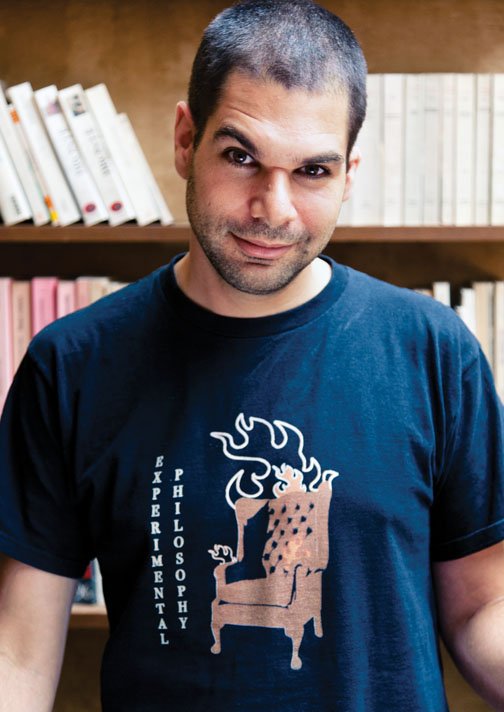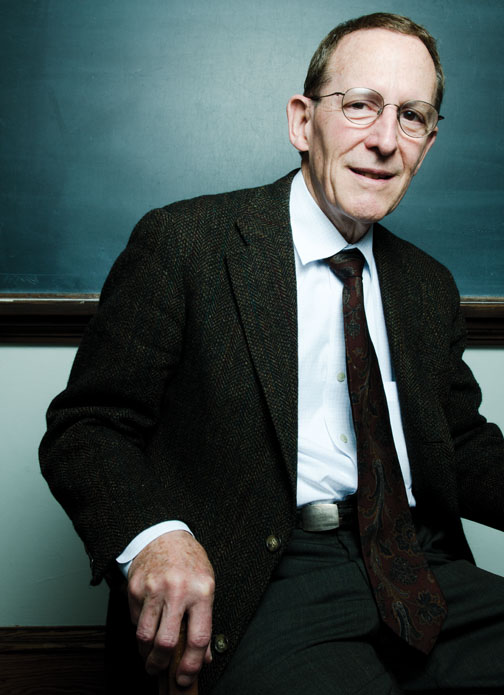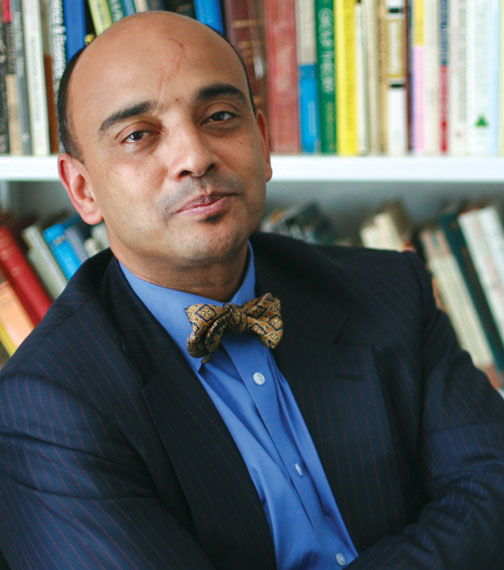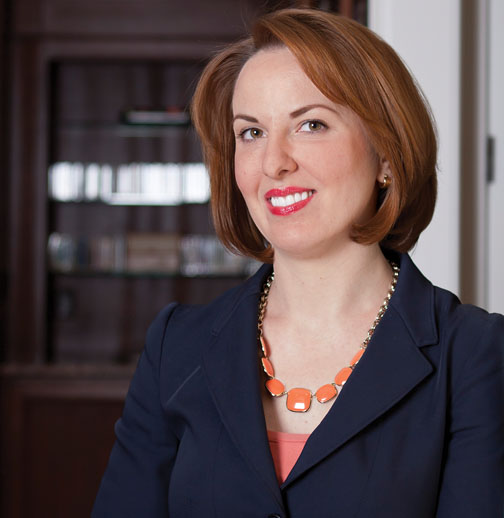Philosophy tests
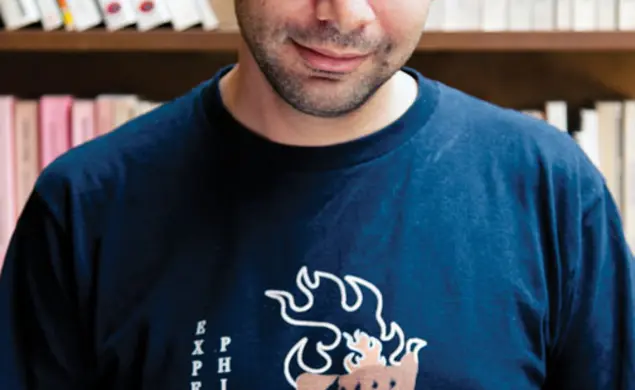 Joshua Knobe *06 is one of experimental philosophy’s leading lights
Joshua Knobe *06 is one of experimental philosophy’s leading lightsImagine a particularly horrific wartime dilemma. You’re a doctor tending to people in the squalid Jewish ghetto of a Nazi-occupied town, where several of your patients have come down with typhoid fever. The expedient thing would be to report that to the authorities, even though the patients face certain execution. If you don’t report it, you’re risking an outbreak that would result in the Nazis executing everyone in the ghetto (including you) and burning it to the ground. So what is the ethically and morally “right” thing to do?
This scenario happened in Kovno, Lithuania, during World War II — the doctor kept quiet and, with others, quelled the outbreak. It’s the sort of moral question that philosophers regularly grapple with. For most of the past century, the time-honored method for philosophical consideration of such questions was to sit and ponder them alone. Those trained in philosophical thinking should arrive at intuitions about right and wrong that are defensible as universal and true.
Except that in the real world, there’s not much consensus about anything. That especially goes for questions of morality, where one person’s obligation to act in a way that yields the utilitarian greater good is another’s unconscionable assumption of the role of God. Enter “experimental philosophy” — or “x-phi” — a method that brings ordinary folks into the process.
Where traditional philosophers try to deduce what everyone else thinks by intuition, experimental philosophers ask everyone else what they think directly. X-phi data can take the form of everything from opinion surveys to magnetic resonance imaging (MRI) scans. Then, applying a philosophical mindset to the research data, experimental philosophers seek to arrive at universal insights into free will, intentionality, the existence of objective moral truth, and other age-old questions. Among other things, experimental philosophers have discovered that there is far less unanimity of opinion out there than traditional philosophy has maintained.
“The terrific thing about experimental philosophy is that, before it happened, philosophers would say, ‘This is intuitively the right answer,’” says Princeton philosophy professor Gilbert Harman. “Then they’d try to develop a theory accounting for that intuition. If you did not share that intuition, you were out of luck.”
Princeton is ground zero for experimental philosophy, and Harman its father — even though Harman describes his relationship with x-phi as “complicated” because he doesn’t do philosophy experiments himself. But some of the field’s leading figures have passed through Harman’s classrooms over the last decade, where they heard questions like those he recently was asking 200 undergraduates in an “Introduction to Moral Philosophy” class.
“Is morality something you can get into disagreements over?” Harman asked. “About who is right and who is wrong? And if so, is there a way of finding out the answer? Are there ways of testing one moral theory against another in the world? Is there observational evidence to gather?”
Not so long ago, the vast majority of Western philosophers would have answered that last question with a resounding no. Philosophical common wisdom dominating the field for most of the 20th century held that ruminating in isolation was the one true way to test moral theories. Along about the turn of the 21st century, however, some philosophers began venturing outside the discipline’s ivory tower to canvas population samples, then using that data to draw philosophical conclusions.
In contrast to 20th-century philosophy’s solitary bent, experimental philosophy lends itself to collaboration — with other disciplines as well as among philosophers. Princeton philosophy professor Kwame Anthony Appiah, who this year won a National Humanities Medal, is not an experimental philosopher himself, but watched the discipline’s development at Princeton from close range and wrote a book about it, 2008’s Experiments in Ethics.
“Experimental philosophy is an interface between philosophy and computer science, psychology, mathematics, economics, the descriptive social sciences,” Appiah explains in an interview. “Previous generations of philosophers would have been delighted to have access to these tools. It never would have occurred to them to say ‘that’s not philosophy.’ ”
Most philosophers practicing x-phi are relatively young. Depending on a given university’s emphasis or politics, you’re as likely to find them in a psychology department as in the philosophy department. They are less given to absolute pronouncements, and more likely to accept the notion that long-held beliefs about human intuitions of right and wrong might not be as universal as we’ve been led to believe.
“When I talk to people about experimental philosophy and how it got started, the answer is that it all began in New Jersey with a group of people moving this forward at the same time,” says Joshua Knobe *06, one of the field’s leading lights.
Depending on whom you ask, experimental philosophy is either an exciting breakthrough or a trendy, tragic dead end. The latter opinion is popular among scholars like Oxford philosopher Timothy Williamson, who asserted in an address to the Aristotelian Society: “If anything can be pursued in an armchair, philosophy can.” In a 2010 essay in The New York Times, he denounced experimental philosophy as “imitation psychology” and the work of “philosophy-hating philosophers.”
The traditional, armchair model occupies the theoretical realm of pure abstract thought. To the traditional philosopher, real-world input is an unnecessary, unseemly distraction from the business at hand. Still, even a skeptic like Princeton philosophy professor Gideon Rosen acknowledges experimental philosophy’s appeal. “The rap against philosophy has always been that there’s no method or cumulative development of results,” Rosen says. “So it’s not surprising that something came along that looked like scientific method, and people paid attention.”
In fact, empirical data has had a place in philosophy for centuries. In Experiments in Ethics, Appiah claims that experimental philosophy’s engagement with the larger world makes it “really more traditional” than what today is considered traditional philosophy. “You can do good work without an MRI, but it’s an interesting question of philosophical taste or method,” says Appiah. “How important is empirical knowledge to philosophy? I think the answer is ‘hugely’ and always has been.”
Twentieth-century “analytic philosophy,” concerned largely with scientific matters, was championed by Harvard professor Willard Van Orman Quine — who summarized his view of the unity of philosophy and science with the famous quip, “Philosophy of science is philosophy enough.” One of Quine’s graduate students at Harvard was Harman, who came to Princeton’s philosophy department in 1963 and helped foster an atmosphere of openness to empirical data. And one of Harman’s faculty colleagues at Princeton was someone he’d known when both were undergraduates at Swarthmore College, psychology professor John Darley.
In the 1960s, Darley did a series of groundbreaking psychological studies that yielded up the “bystander effect.” Also known as “Genovese syndrome,” after Kitty Genovese, who died after her cries for help went unanswered when she was stabbed in New York City in 1964, it holds that the probability of a bystander offering help in an emergency is inversely proportional to the number of other bystanders present, because each person is less likely to assume responsibility for taking action.
Still, it would take another generation for practicing philosophers to start doing research and attempting to interpret the results philosophically. You can trace much of the current wave of experimental philosophy to a single class first offered at Princeton in the spring of 2000, “Ethics: Philosophical, Psychological and Cognitive Science Perspectives,” taught jointly by Harman, Darley, and Rutgers philosophy professor Stephen Stich *68.
“For a decade before that, it had been a very depressing world out there,” says Stich. “People working in moral psychology had little understanding of the philosophical literature, while people working in philosophy had no acquaintance with the empirical literature.” The class brought together people in each discipline who were committed to understanding what people in the other discipline were doing, Stich says, and the result was “the birth of a new and now-burgeoning interdisciplinary domain — real moral psychology, as I like to call it.”
Enrolled in the class, an updated version of which will be offered next fall, were students both of philosophy and of social psychology, the science of how people’s behaviors, emotions, and thoughts are influenced by the presence or absence of others. The class was so successful that a form of it exists to this day as the Moral Psychology Research Group, or MPRG. An assemblage of 21 academics from philosophy and psychology, the MPRG meets twice yearly, most recently last month at Purdue University.
MPRG members include Stich and Harman; Shaun Nichols, a student of Stich at Rutgers and author of a landmark experimental-philosophy survey about cultural differences in the intuitions of Westerners and Asians; Victoria McGeer, a philosophy professor at Princeton’s University Center For Human Values who studies crime, punishment, and “restorative justice” (a method of brokering agreements between criminals and victims); and two Princeton alumni named Josh: Knobe, at Yale; and Joshua Greene *02, who teaches at Harvard.
Greene joined Harvard’s psychology department for myriad reasons, including access to lab space, subjects, research funds, and methodologically minded colleagues. But he’s a philosopher at heart, going back to when he would debate philosophical issues with his middle-school debate club. Greene had the inspiration to use MRI technology to examine the brains of people pondering questions of morality to see which regions — those tied to reason or to emotion — lit up. As a student in Harman and Darley’s ethics class, he brought scans to class to discuss with his classmates.
The scans showed brain reactions of people contemplating the “trolley problem,” a classic thought experiment devised by British philosopher Philippa Foot in 1967. In the problem, a trolley is hurtling down a set of tracks headed straight for five people, who face certain death unless someone takes action to divert the trolley onto another track, where only one person is waiting. So the dilemma is to do nothing and let five people die, or intervene at the cost of another person’s dying. In one version of this thought experiment, the trolley may be stopped by a heavy weight when it passes under a bridge — and as it happens, a very heavy man happens to be standing on the bridge.
In concocting variations on the trolley problem, Greene discovered that the more impersonal the method of intervention — flipping a switch versus throwing the heavy man off the bridge to stop the trolley, for example — the more likely people were to think in terms of greater-good utility. If the one death seemed like an indirect effect, and not a direct effect of the intervention, it was more likely to pass ethical muster from respondents. The more direct the intervention seemed, the more emotional the response. Follow-up studies also have been done using patients with damage to the ventromedial prefrontal cortex, the part of the brain that integrates emotional signals into decisions. “Those people were more likely to say it was OK to push the guy off the bridge,” Greene says. “They didn’t have that emotional response, so they could think in strictly cost-benefit terms. To them, the bridge looked just like the switch did to ordinary people.”
Philosophy can seem far removed from everyday reality, but this is research with real-world applications. In terms of shaping public opinion, it’s a short step from the trolley problem to accepting civilian deaths during a war: Those deaths are deemed necessary to avoid still more deaths. Consider a case where a munitions factory is bombed and civilians are killed (labeled collateral damage) versus one where civilians are bombed directly to reduce morale (considered terror bombing).
“In both cases, civilians are killed,” Greene says. “The general conventions of war hold that terror bombing is not OK, but collateral damage can be. So you can look at the brain’s processes in thinking about that, whether rational or emotional thinking is predominant.”
One conclusion is that philosophy and moral psychology’s widely held view of moral judgment as primarily a matter of reasoning might be fatally flawed, because emotions have a lot to do with the process. Greene and other experimental philosophers still are groping toward defining the philosophical intuitions behind this dynamic, and whether or not what people think is morally right actually is morally right.
In a related vein, Princeton philosophy professor Sarah-Jane Leslie *07 does philosophical experiments involving “generics,” statements that express generalizations — “tigers are striped,” for example. Where that gets tricky is with statements that are true but misleading because they’re incomplete. “Mosquitoes carry West Nile virus” is true, even though less than 1 percent of mosquitoes actually do.
You can try to correct that to, “Some mosquitoes carry West Nile virus.” But Leslie’s research shows that people are likely to default from the specific to the generic, so the sentence still tends to be laid down in memory as, “Mosquitoes carry West Nile virus.” And if there is outside input such as people talking about the danger of West Nile virus, that can turn into, “All mosquitos carry West Nile virus.”
That has great implications for the way people generalize, Leslie suggests. “Take prejudice. ‘Ticks carry Lyme disease,’ ‘tigers eat people,’ and ‘pit bulls maul children’ are all true, even though few ticks, tigers, and pit bulls do that. But people are predisposed to accept those statements, especially because they’re about bad things you want to avoid.
“Now,” she adds, “think about this one: ‘Muslims are terrorists.’ That was a big one after 9/11, even though very few Muslims were involved. But suddenly, it was as if all Muslims really were terrorists. What prejudice did that spawn? How do we understand and combat it?”
Joshua Knobe’s best-known contribution to experimental philosophy also is related to issues of blame, going back to a survey he conducted in New York City’s Washington Square Park. It was a question of intentionality, based on the following scenario: A proposed new product will increase profits, but at the cost of harming the environment. Declaring that he cares about money and not the environment, the head of a company gives the go-ahead to make the product. As expected, profits rise, as does environmental damage. So Knobe asked survey respondents if the executive was to blame for harm to the environment, and 82 percent said yes.
Now imagine the same scenario, with one key difference: The new product helps rather than hurts the environment. The executive still cares just about profits, so the new product goes forward and the money rolls in. But when asked if the executive had helped the environment, only 23 percent of Knobe’s respondents gave him credit for that.
Thus was born the “Knobe effect,” which summarizes that people are moralizing creatures who are far more likely to assign blame for bad things than credit for good things. Knobe has done further research delving into questions of free will, determinism, and the philosophical processes that are involved in triggering emotional versus rational responses when it comes to passing judgment.
The Knobe effect, which he uncovered while still a graduate student at Princeton, frequently is referenced in election years to explain the effectiveness of negative political advertising. It also made Knobe a star and one of experimental philosophy’s most visible figures. He is writing a book about experimental philosophy that he hopes will evoke the image of an armchair going up in flames.
Not everyone is convinced. “If you had put this to philosophers before the advent of experimental philosophy, you would have seen this same contrast,” Gideon Rosen says. “Sure, you can go out and do surveys to confirm it. But those intuitions are interesting and available without doing surveys. Even if Knobe had never done an experiment in his life, he could have written a paper about this with the same significance. My hunch is that philosophers are good at channeling the judgments ordinary people would make.”
Maybe, maybe not. Anthony Appiah, who was one of Knobe’s dissertation readers at Princeton, thinks that such surveys can only enhance the process of philosophy.
“The question isn’t if you could come to the same conclusion without experiments,” says Appiah, “but do the experiments move us ahead in different ways or faster than sitting around reflecting? I think it would be hard to argue this hasn’t helped stimulate new questions. The test will be 10 years from now, what we’ve learned by then.”
Another common attack on experimental philosophy is that because most experiments involve asking the opinions of people not trained in philosophical thinking, the results are not valid. It’s “folk philosophy,” what ordinary people think of as philosophy, rather than the real thing.
“[In] some of these surveys, it’s unclear why the results are relevant to philosophy,” Rosen says. “So why jump through hoops? Why not just discuss substantive questions of right and wrong with people who have been trained to think about hard cases?” Nonsense, says Stich.
“The whole ‘expertise defense’ [of armchair philosophy] says it doesn’t matter what the man on the street thinks about intuitive knowledge, moral permissibility, or intentionality, because he’s not an expert,” Stich says. “Philosophers claim to be the only experts capable of producing philosophical intuitions. But are they? Do you have to have six years of graduate training at a prestige university to be philosophically savvy?”
In recent years, Stich has been doing survey experiments to see if philosophers have systematically different intuitions from ordinary people (which conceivably would render professional philosophers’ judgments less universal than the discipline claims). Early indications are that they do, Stich says. But while those philosophers’ “right” intuitions might win over similarly minded peers on a tenure committee, does that give them the weight of inherent truth? Experimental philosophy amounts to a generation saying, not so fast. Ultimately, the debate seems to come down to who owns philosophy and even truth — a closed society of experts, or everyone?
“Truth does not belong to philosophy but to all of us,” says Appiah. “How ordinary people use it is part of the accounting, even if they’re deploying it in ways that may be slippery and incoherent. Language and the mind are both messy, and so is the world.
“Reality,” Appiah says, “is never tidy.”
David Menconi is a music critic and feature writer at the News & Observer in Raleigh, N.C.
The Latest
See all


